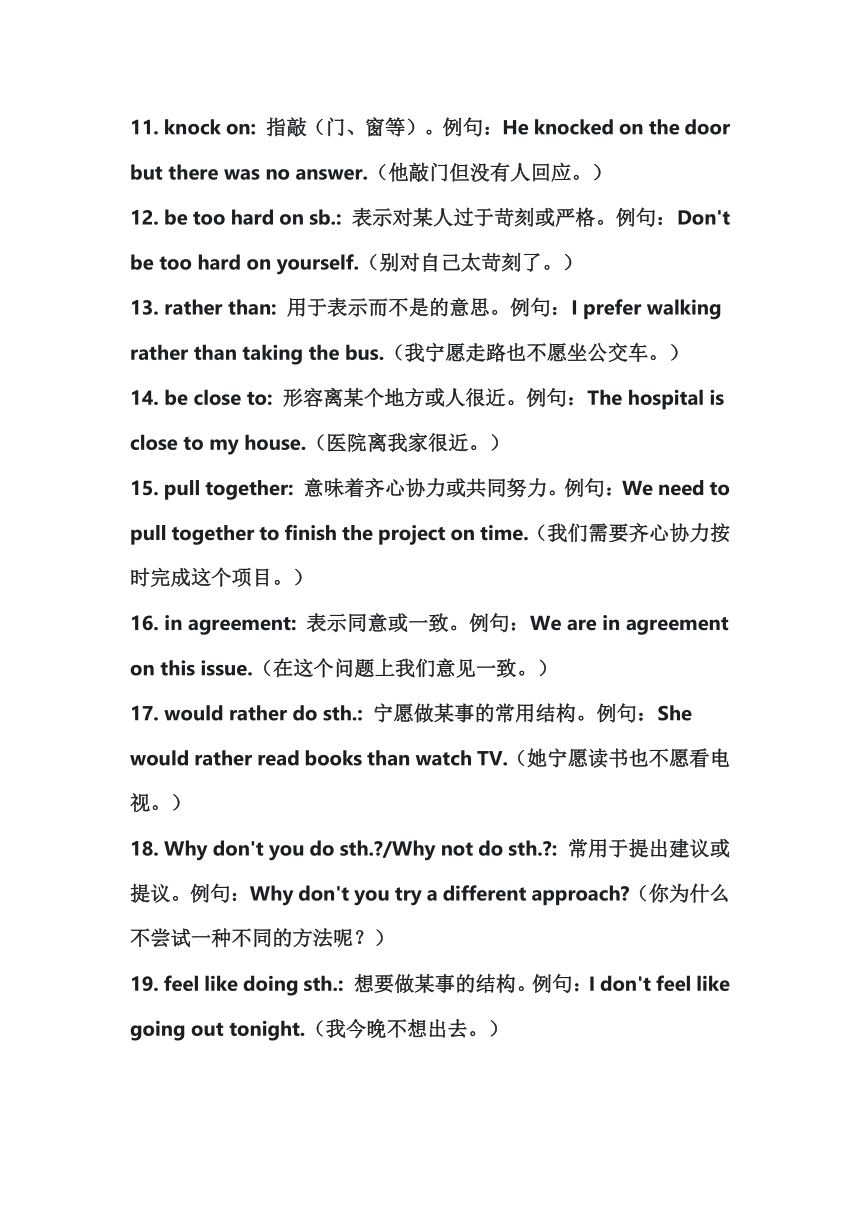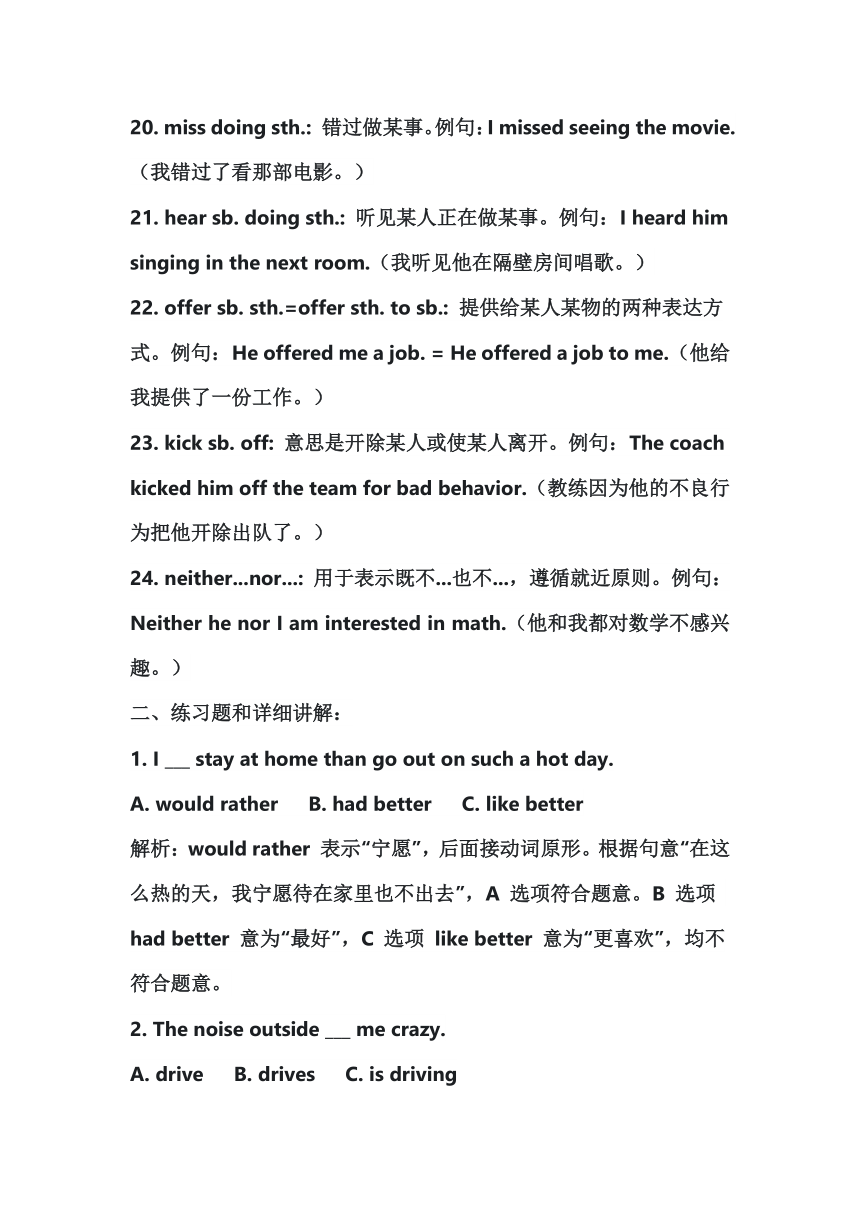Unit 11 Sad movies make me cry.固定短语具体用法讲义
文档属性
| 名称 | Unit 11 Sad movies make me cry.固定短语具体用法讲义 |  | |
| 格式 | docx | ||
| 文件大小 | 20.5KB | ||
| 资源类型 | 教案 | ||
| 版本资源 | 人教新目标(Go for it)版 | ||
| 科目 | 英语 | ||
| 更新时间 | 2024-02-08 08:37:57 | ||
图片预览



文档简介
人教版英语九年级11单元固定短语具体用法讲义
一、固定短语具体用法:
1. would rather: 表示宁愿做某事,常与 than 连用。例句:I would rather stay at home than go out.(我宁愿待在家里也不愿出去。)
2. drive sb. crazy/mad: 指使某人发疯或发狂。例句:The noise is driving me crazy.(噪音快把我逼疯了。)
3. be sure: 表示确信或确定。例句:I'm sure he will come.(我确信他会来。)
4. leave out: 意为不包括或忽略。例句:He left out an important detail.(他忽略了一个重要的细节。)
5. feel left out: 表示感觉被忽略或被排除在外。例句:I always feel left out in group activities.(在团队活动中,我总是感觉被忽略。)
6. feel like: 可以表示感觉像或想要做某事。例句:I feel like having a cup of coffee.(我想喝杯咖啡。)
7. take one's position: 指取代某人的位置或职位。例句:She took my position when I was on leave.(我休假时,她取代了我的位置。)
8. to start with: 意思是起初或开始时。例句:To start with, we need to make a plan.(首先,我们需要制定一个计划。)
9. clean up: 可以指打扫或清理。例句:Let's clean up the room before guests arrive.(在客人到来之前,我们把房间打扫一下。)
10. let...down: 意味着使某人失望。例句:Don't let me down again.(别再让我失望了。)
11. knock on: 指敲(门、窗等)。例句:He knocked on the door but there was no answer.(他敲门但没有人回应。)
12. be too hard on sb.: 表示对某人过于苛刻或严格。例句:Don't be too hard on yourself.(别对自己太苛刻了。)
13. rather than: 用于表示而不是的意思。例句:I prefer walking rather than taking the bus.(我宁愿走路也不愿坐公交车。)
14. be close to: 形容离某个地方或人很近。例句:The hospital is close to my house.(医院离我家很近。)
15. pull together: 意味着齐心协力或共同努力。例句:We need to pull together to finish the project on time.(我们需要齐心协力按时完成这个项目。)
16. in agreement: 表示同意或一致。例句:We are in agreement on this issue.(在这个问题上我们意见一致。)
17. would rather do sth.: 宁愿做某事的常用结构。例句:She would rather read books than watch TV.(她宁愿读书也不愿看电视。)
18. Why don't you do sth. /Why not do sth. : 常用于提出建议或提议。例句:Why don't you try a different approach (你为什么不尝试一种不同的方法呢?)
19. feel like doing sth.: 想要做某事的结构。例句:I don't feel like going out tonight.(我今晚不想出去。)
20. miss doing sth.: 错过做某事。例句:I missed seeing the movie.(我错过了看那部电影。)
21. hear sb. doing sth.: 听见某人正在做某事。例句:I heard him singing in the next room.(我听见他在隔壁房间唱歌。)
22. offer sb. sth.=offer sth. to sb.: 提供给某人某物的两种表达方式。例句:He offered me a job. = He offered a job to me.(他给我提供了一份工作。)
23. kick sb. off: 意思是开除某人或使某人离开。例句:The coach kicked him off the team for bad behavior.(教练因为他的不良行为把他开除出队了。)
24. neither...nor...: 用于表示既不...也不...,遵循就近原则。例句:Neither he nor I am interested in math.(他和我都对数学不感兴趣。)
二、练习题和详细讲解:
1. I ___ stay at home than go out on such a hot day.
A. would rather B. had better C. like better
解析:would rather 表示“宁愿”,后面接动词原形。根据句意“在这么热的天,我宁愿待在家里也不出去”,A 选项符合题意。B 选项 had better 意为“最好”,C 选项 like better 意为“更喜欢”,均不符合题意。
2. The noise outside ___ me crazy.
A. drive B. drives C. is driving
解析:drive sb. crazy/mad 表示“使某人发疯/发狂”。句子主语 the noise 是第三人称单数,时态为一般现在时,谓语动词用 drives。A 选项 drive 是动词原形,C 选项 is driving 是现在进行时,均不符合题意。
3. You ___ be careful with the knife. It's very sharp.
A. must B. can C. may
解析:be sure 表示“确信;确定”,sure 常与 must 连用,表示“一定要”。根据句意“你一定要小心那把刀。它很锋利”,A 选项 must 符合题意。B 选项 can 表示“能够”,C 选项 may 表示“可能”,均不符合题意。
4. He ___ an important detail in his report.
A. left out B. left for C. left with
解析:leave out 表示“不包括;忽略”。根据句意“他在报告中忽略了一个重要细节”,A 选项符合题意。B 选项 left for 意为“动身去”,C 选项 left with 意为“留下”,均不符合题意。
5. I always ___ left out when my family makes plans.
A. feel B. feels C. felt
解析:feel left out 表示“感觉被忽略”。句子主语 I 是第一人称,谓语动词用 feel。句子时态为一般现在时,A 选项符合题意。B 选项 feels 是第三人称单数形式,C 选项 felt 是过去式,均不符合题意。
6. I ___ having a picnic in the park this weekend.
A. feel like B. would like C. want
解析:feel like 表示“感觉像;想要”,后面接动词 ing 形式。根据句意“这周末我想去公园野餐”,A 选项符合题意。B 选项 would like 后面接 to do,C 选项 want 后面接 to do 或直接接名词,均不符合题意。
7. She will take my position when I am away on business.
A. instead of B. rather than C. in place of
解析:take one's position 表示“取代某人;代替某人”,instead of 和 in place of 都可以表示“代替”,rather than 表示“而不是”。根据句意“我出差时,她将取代我的位置”,C 选项符合题意。A 选项 instead of 常位于句中,B 选项 rather than 常与 than 连用,均不符合题意。
8. We should ___ the problems and find solutions.
A. look for B. start with C. clean up
解析:to start with 表示“起初;开始”,start with 也可以表示“以……开始”。根据句意“我们应该从问题开始,找到解决方案”,B 选项符合题意。A 选项 look for 表示“寻找”,C 选项 clean up 表示“打扫”,均不符合题意。
9. The classroom is very dirty. We need to ___ it.
A. clean up B. put up C. set up
解析:clean up 表示“打扫”。根据句意“教室很脏。我们需要打扫一下”,A 选项符合题意。B 选项 put up 意为“张贴”,C 选项 set up 意为“建立”,均不符合题意。
10. Don't ___ my hopes. I'm sure I can succeed.
A. let down B. put down C. cut down
解析:let down 表示“使失望”。根据句意“不要让我失望。我相信我能成功”,A 选项符合题意。B 选项 put down 意为“放下”,C 选项 cut down 意为“削减”,均不符合题意。
11. Someone is knocking ___ the door. Please go and open it.
A. at B. on C. in
解析:knock on 表示“敲(门、窗等)”。根据句意“有人在敲门。请去开一下”,B 选项符合题意。A 选项 knock at 也可以表示“敲(门、窗等)”,但通常与 at 连用,C 选项 knock in 意为“敲入”,均不符合题意。
12. My parents are always ___ on me. I feel very stressed.
A. hard B. hardly C. too hard
解析:be too hard on sb. 表示“对某人太苛刻”。根据句意“我的父母总是对我太苛刻。我感到很有压力”,C 选项符合题意。A 选项 hard 作形容词时,意为“困难的”,B 选项 hardly 意为“几乎不”,均不符合题意。
13. I prefer to go to the cinema ___ watch TV.
A. rather than B. instead of C. than
解析:rather than 表示“而不是”,可以连接两个并列成分。根据句意“我宁愿去看电影而不是看电视”,A 选项符合题意。B 选项 instead of 也表示“而不是”,但其后接名词、代词或动名词,C 选项 than 常与比较级连用,均不符合题意。
14. The library is ___ the school. We can go there to read books.
A. close to B. close C. near
解析:be close to 表示“离……近”。根据句意“图书馆离学校很近。我们可以去那里读书”,A 选项符合题意。B 选项 close 作形容词时,意为“亲密的”,C 选项 near 意为“在……附近”,均不符合题意。
15. We need to ___ together to solve this problem.
A. pull B. push C. pull up
解析:pull together 表示“齐心协力”。根据句意“我们需要齐心协力解决这个问题”,A 选项符合题意。B 选项 push 意为“推”,C 选项 pull up 意为“停下”,均不符合题意。
一、固定短语具体用法:
1. would rather: 表示宁愿做某事,常与 than 连用。例句:I would rather stay at home than go out.(我宁愿待在家里也不愿出去。)
2. drive sb. crazy/mad: 指使某人发疯或发狂。例句:The noise is driving me crazy.(噪音快把我逼疯了。)
3. be sure: 表示确信或确定。例句:I'm sure he will come.(我确信他会来。)
4. leave out: 意为不包括或忽略。例句:He left out an important detail.(他忽略了一个重要的细节。)
5. feel left out: 表示感觉被忽略或被排除在外。例句:I always feel left out in group activities.(在团队活动中,我总是感觉被忽略。)
6. feel like: 可以表示感觉像或想要做某事。例句:I feel like having a cup of coffee.(我想喝杯咖啡。)
7. take one's position: 指取代某人的位置或职位。例句:She took my position when I was on leave.(我休假时,她取代了我的位置。)
8. to start with: 意思是起初或开始时。例句:To start with, we need to make a plan.(首先,我们需要制定一个计划。)
9. clean up: 可以指打扫或清理。例句:Let's clean up the room before guests arrive.(在客人到来之前,我们把房间打扫一下。)
10. let...down: 意味着使某人失望。例句:Don't let me down again.(别再让我失望了。)
11. knock on: 指敲(门、窗等)。例句:He knocked on the door but there was no answer.(他敲门但没有人回应。)
12. be too hard on sb.: 表示对某人过于苛刻或严格。例句:Don't be too hard on yourself.(别对自己太苛刻了。)
13. rather than: 用于表示而不是的意思。例句:I prefer walking rather than taking the bus.(我宁愿走路也不愿坐公交车。)
14. be close to: 形容离某个地方或人很近。例句:The hospital is close to my house.(医院离我家很近。)
15. pull together: 意味着齐心协力或共同努力。例句:We need to pull together to finish the project on time.(我们需要齐心协力按时完成这个项目。)
16. in agreement: 表示同意或一致。例句:We are in agreement on this issue.(在这个问题上我们意见一致。)
17. would rather do sth.: 宁愿做某事的常用结构。例句:She would rather read books than watch TV.(她宁愿读书也不愿看电视。)
18. Why don't you do sth. /Why not do sth. : 常用于提出建议或提议。例句:Why don't you try a different approach (你为什么不尝试一种不同的方法呢?)
19. feel like doing sth.: 想要做某事的结构。例句:I don't feel like going out tonight.(我今晚不想出去。)
20. miss doing sth.: 错过做某事。例句:I missed seeing the movie.(我错过了看那部电影。)
21. hear sb. doing sth.: 听见某人正在做某事。例句:I heard him singing in the next room.(我听见他在隔壁房间唱歌。)
22. offer sb. sth.=offer sth. to sb.: 提供给某人某物的两种表达方式。例句:He offered me a job. = He offered a job to me.(他给我提供了一份工作。)
23. kick sb. off: 意思是开除某人或使某人离开。例句:The coach kicked him off the team for bad behavior.(教练因为他的不良行为把他开除出队了。)
24. neither...nor...: 用于表示既不...也不...,遵循就近原则。例句:Neither he nor I am interested in math.(他和我都对数学不感兴趣。)
二、练习题和详细讲解:
1. I ___ stay at home than go out on such a hot day.
A. would rather B. had better C. like better
解析:would rather 表示“宁愿”,后面接动词原形。根据句意“在这么热的天,我宁愿待在家里也不出去”,A 选项符合题意。B 选项 had better 意为“最好”,C 选项 like better 意为“更喜欢”,均不符合题意。
2. The noise outside ___ me crazy.
A. drive B. drives C. is driving
解析:drive sb. crazy/mad 表示“使某人发疯/发狂”。句子主语 the noise 是第三人称单数,时态为一般现在时,谓语动词用 drives。A 选项 drive 是动词原形,C 选项 is driving 是现在进行时,均不符合题意。
3. You ___ be careful with the knife. It's very sharp.
A. must B. can C. may
解析:be sure 表示“确信;确定”,sure 常与 must 连用,表示“一定要”。根据句意“你一定要小心那把刀。它很锋利”,A 选项 must 符合题意。B 选项 can 表示“能够”,C 选项 may 表示“可能”,均不符合题意。
4. He ___ an important detail in his report.
A. left out B. left for C. left with
解析:leave out 表示“不包括;忽略”。根据句意“他在报告中忽略了一个重要细节”,A 选项符合题意。B 选项 left for 意为“动身去”,C 选项 left with 意为“留下”,均不符合题意。
5. I always ___ left out when my family makes plans.
A. feel B. feels C. felt
解析:feel left out 表示“感觉被忽略”。句子主语 I 是第一人称,谓语动词用 feel。句子时态为一般现在时,A 选项符合题意。B 选项 feels 是第三人称单数形式,C 选项 felt 是过去式,均不符合题意。
6. I ___ having a picnic in the park this weekend.
A. feel like B. would like C. want
解析:feel like 表示“感觉像;想要”,后面接动词 ing 形式。根据句意“这周末我想去公园野餐”,A 选项符合题意。B 选项 would like 后面接 to do,C 选项 want 后面接 to do 或直接接名词,均不符合题意。
7. She will take my position when I am away on business.
A. instead of B. rather than C. in place of
解析:take one's position 表示“取代某人;代替某人”,instead of 和 in place of 都可以表示“代替”,rather than 表示“而不是”。根据句意“我出差时,她将取代我的位置”,C 选项符合题意。A 选项 instead of 常位于句中,B 选项 rather than 常与 than 连用,均不符合题意。
8. We should ___ the problems and find solutions.
A. look for B. start with C. clean up
解析:to start with 表示“起初;开始”,start with 也可以表示“以……开始”。根据句意“我们应该从问题开始,找到解决方案”,B 选项符合题意。A 选项 look for 表示“寻找”,C 选项 clean up 表示“打扫”,均不符合题意。
9. The classroom is very dirty. We need to ___ it.
A. clean up B. put up C. set up
解析:clean up 表示“打扫”。根据句意“教室很脏。我们需要打扫一下”,A 选项符合题意。B 选项 put up 意为“张贴”,C 选项 set up 意为“建立”,均不符合题意。
10. Don't ___ my hopes. I'm sure I can succeed.
A. let down B. put down C. cut down
解析:let down 表示“使失望”。根据句意“不要让我失望。我相信我能成功”,A 选项符合题意。B 选项 put down 意为“放下”,C 选项 cut down 意为“削减”,均不符合题意。
11. Someone is knocking ___ the door. Please go and open it.
A. at B. on C. in
解析:knock on 表示“敲(门、窗等)”。根据句意“有人在敲门。请去开一下”,B 选项符合题意。A 选项 knock at 也可以表示“敲(门、窗等)”,但通常与 at 连用,C 选项 knock in 意为“敲入”,均不符合题意。
12. My parents are always ___ on me. I feel very stressed.
A. hard B. hardly C. too hard
解析:be too hard on sb. 表示“对某人太苛刻”。根据句意“我的父母总是对我太苛刻。我感到很有压力”,C 选项符合题意。A 选项 hard 作形容词时,意为“困难的”,B 选项 hardly 意为“几乎不”,均不符合题意。
13. I prefer to go to the cinema ___ watch TV.
A. rather than B. instead of C. than
解析:rather than 表示“而不是”,可以连接两个并列成分。根据句意“我宁愿去看电影而不是看电视”,A 选项符合题意。B 选项 instead of 也表示“而不是”,但其后接名词、代词或动名词,C 选项 than 常与比较级连用,均不符合题意。
14. The library is ___ the school. We can go there to read books.
A. close to B. close C. near
解析:be close to 表示“离……近”。根据句意“图书馆离学校很近。我们可以去那里读书”,A 选项符合题意。B 选项 close 作形容词时,意为“亲密的”,C 选项 near 意为“在……附近”,均不符合题意。
15. We need to ___ together to solve this problem.
A. pull B. push C. pull up
解析:pull together 表示“齐心协力”。根据句意“我们需要齐心协力解决这个问题”,A 选项符合题意。B 选项 push 意为“推”,C 选项 pull up 意为“停下”,均不符合题意。
同课章节目录
- Unit 1 How can we become good learners.
- Section A
- Section B
- Unit 2 I think that mooncakes are delicious!
- Section A
- Section B
- Unit 3 Could you please tell me where the restroom
- Section A
- Section B
- Unit 4 I used to be afraid of the dark.
- Section A
- Section B
- Unit 5 What are the shirts made of?
- Section A
- Section B
- Review of Units 1-5
- Unit 6 When was it invented?
- Section A
- Section B
- Unit 7 Teenagers should be allowed to choose their
- Section A
- Section B
- Unit 8 It must belong to Carla.
- Section A
- Section B
- Unit 9 I like music that I can dance to.
- Section A
- Section B
- Unit 10 You're supposed to shake hands.
- Section A
- Section B
- Review of Units 6-10
- Unit 11 Sad movies make me cry.
- Section A
- Section B
- Unit 12 Life is full of the unexpected
- Section A
- Section B
- Unit 13 We're trying to save the earth!
- Section A
- Section B
- Unit 14 I remember meeting all of you in Grade 7.
- Section A
- Section B
- Review of Units 11-14
